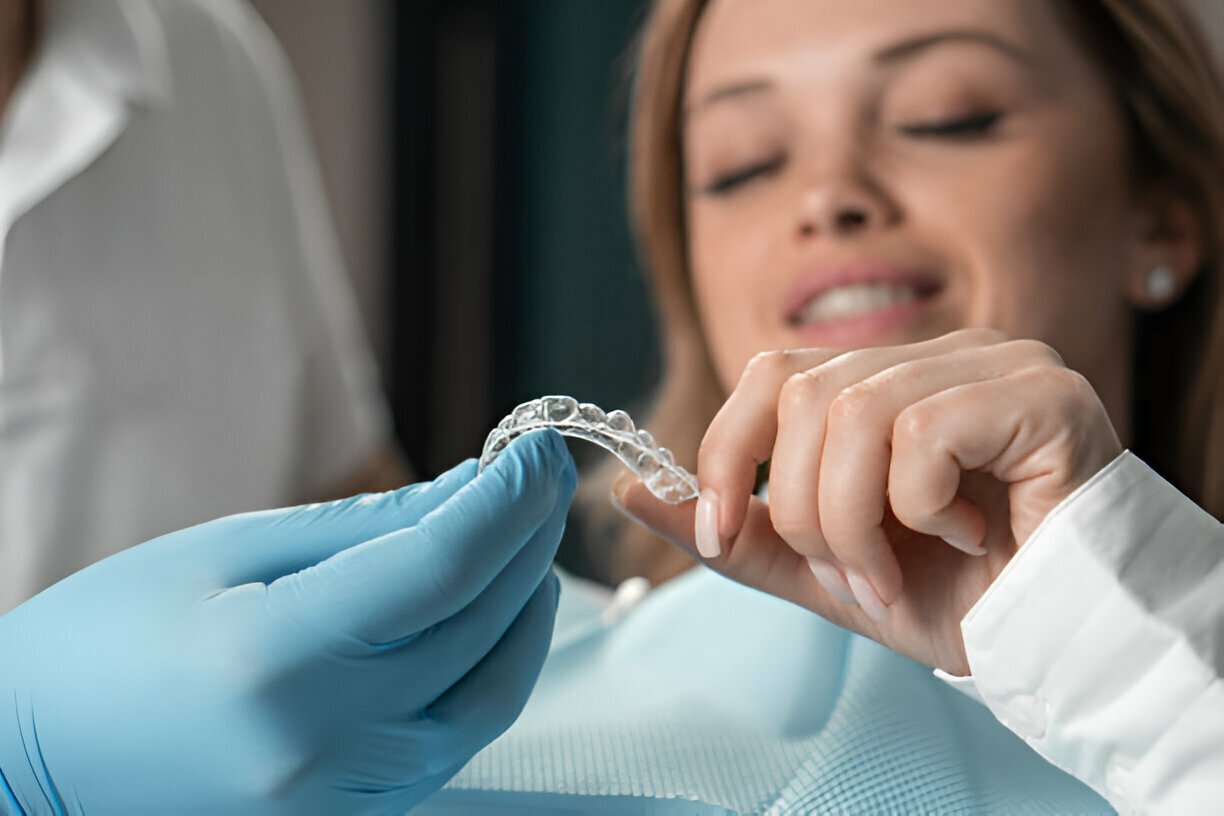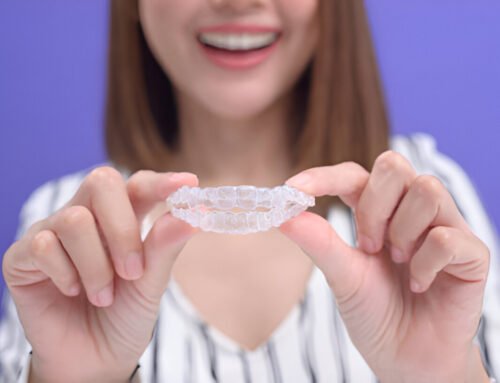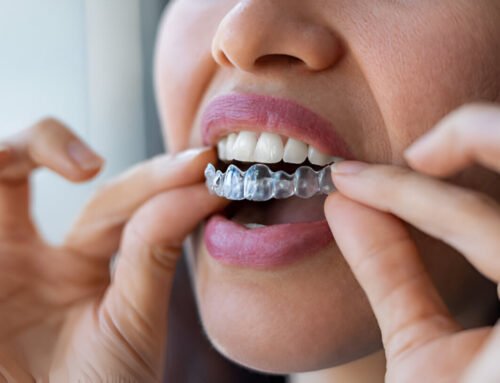Can You Get Invisalign on the NHS?
Invisalign braces have revolutionised teeth straightening. These aligners are clear and removable. They are discreet and convenient. They offer a modern alternative to metal braces. However, a common question arises: can you get Invisalign on the NHS?
What is Invisalign?
Invisalign is a popular teeth-straightening treatment that uses clear, plastic aligners. Unlike traditional braces, Invisalign aligners are virtually invisible. You can remove them to eat, drink, and brush your teeth, making them a convenient choice for many people. The aligners are custom-made for each patient. They ensure a snug fit. The fit gradually shifts the teeth into their desired position.
Does Invisalign Hurt?
Advantages of Invisalign
The benefits of Invisalign over traditional braces are numerous. First, their transparent nature means they are hardly noticeable. This is a significant advantage for those who are self-conscious about wearing braces. Additionally, because they are removable, patients can maintain their regular diet without restrictions. There’s no need to avoid certain foods that might damage traditional braces. Also, it’s easier to keep oral hygiene. You can brush and floss without wires and brackets.
NHS Funding for Braces
The NHS provides orthodontic treatment to improve dental health. It’s not for looks. This means the NHS aims to fix severe dental problems rather than minor aesthetic issues. The NHS focuses on ensuring that vital treatments are accessible to those who need them most. But, this must be done within the limits of public funding.
Is Invisalign Worth It?
Who Qualifies for NHS Orthodontic Treatment?
Orthodontic treatment on the NHS is mainly available for children under 18. NHS-funded treatment eligibility is determined by the Index of Orthodontic Treatment Need (IOTN). The IOTN is a rating system that grades the severity of dental problems from 1 to 5:
Score 1-2: Mild issues; not eligible for NHS treatment.
Score 3: Borderline cases; eligibility depends on the orthodontist’s assessment.
Score 4-5: Severe issues; automatically qualify for NHS treatment.
This system ensures the NHS can treat those with the most needs. It puts health issues before cosmetic ones.
Why Doesn’t the NHS Fund Invisalign?
The NHS prefers traditional metal braces for a few reasons. Metal braces are cheap. They let the NHS treat more patients on its tight budget. Invisalign, on the other hand, is more expensive. Also, both metal braces and Invisalign achieve the same results. They straighten teeth. However, Invisalign is a premium product. This is because it is discreet and convenient. But, the NHS does not prioritize those features.
Can Adults Get NHS Orthodontic Treatment?
Generally, adults do not qualify for NHS orthodontic treatment. In rare cases, adults with extreme dental needs might get approval, but this is uncommon. Even in such cases, traditional braces are the go-to option. The NHS focuses on treating children and teenagers. Their teeth are still developing. Dental issues can be treated better while they grow.
How Much is Private Dental Care in Scotland?
Paying for Invisalign Privately
Private treatment is an option for those who do not qualify for NHS treatment. Or, for those who prefer Invisalign. Many dental clinics offer payment plans to make Invisalign more affordable. These plans can include interest-free monthly payments. They also cover additional benefits like teeth whitening and retainers.
Advantages of Paying for Invisalign Privately
While NHS treatment focuses on essential dental health, private treatment offers several perks:
Discreetness: Invisalign aligners are clear and barely noticeable.
Convenience: You can remove them to eat, drink, and maintain oral hygiene.
Comfort: Invisalign is more comfortable. It’s less likely to cause mouth sores because it lacks metal brackets and wires.
Additional Services: Private clinics often offer extras like teeth whitening and shaping. They include these in their Invisalign packages.
Customisation: Private treatment allows for a more tailored approach. It has options that cater to the patient’s needs and preferences.
The Cost of Invisalign
Invisalign treatment can be costly. But, many clinics offer low prices and special deals. A detailed cost breakdown might look something like this:
Consultation: Free in many clinics.
Initial 3D Scan and Smile Preview: Often included in the package.
Aligners: The main cost, which can vary based on the complexity of the case.
Retainers: Included in some packages to maintain the results post-treatment.
Teeth Whitening: Sometimes included as a free extra.
When considering the cost, it’s important to factor in the long-term benefits. These are the benefits of better dental health. They also include more confidence from having a straighter smile.
Invisalign vs. Traditional Braces: A Cost Comparison
Traditional braces are cheaper and are the default choice for NHS treatments. Invisalign, being a premium product, comes at a higher price. However, many people find the extra cost worthwhile. They pay for the added benefits of comfort and beauty. It’s also worth considering the costs of maintaining traditional braces. This includes repairs for broken brackets and wires. These costs can add up over time.
FAQs about Invisalign and NHS
Can children get Invisalign on the NHS?
No, the NHS does not fund Invisalign for children. Traditional braces are used for NHS-funded treatments.
What if I want Invisalign but don’t qualify for NHS funding?
You can opt for private treatment. Many clinics offer payment plans to spread the cost.
Is Invisalign as effective as traditional braces?
Yes, Invisalign is effective for straightening teeth, just like traditional braces.
How long does Invisalign treatment take?
The duration varies depending on the complexity of the case, but it typically ranges from 6 months to 2 years.
Are there any foods I should avoid with Invisalign?
No, you can remove Invisalign aligners when eating, so there are no food restrictions.
How often do I need to visit the dentist with Invisalign?
You need regular check-ups. They are necessary every 6-8 weeks. They are to monitor progress and get new aligners.
Conclusion
Invisalign offers a discreet and easy way to straighten teeth. But, the NHS does not cover it due to cost limits. The NHS prioritises cost-effective treatments. They prefer traditional braces. These treatments help the NHS help more patients. For those who prefer Invisalign, private treatment is an option. It often comes with flexible payment plans and extra benefits.
If you are considering Invisalign, talk to a dental clinic. They can help you explore your options. They can provide a detailed cost breakdown and help you decide if Invisalign is the right choice for you. Remember, a beautiful smile is an investment in your confidence and overall well-being.
Book Your Consultation Today!
Ready to Start Your Invisalign Journey?
At Broxburn Smile Centre, we understand the importance of a confident smile. That’s why we offer comprehensive Invisalign treatments tailored to your needs. Our team is experienced. They provide free consultations to discuss your options. They will create a personalised treatment plan.
Take advantage of our flexible payment plans. They include interest-free monthly payments. They make your dream smile more accessible. Our all-inclusive packages come with extra benefits. These include teeth whitening and custom retainers. They ensure you get the best care possible.
Contact Broxburn Smile Centre today to book your free, no-obligation consultation. Let us help you get the smile you’ve always wanted. You can do it with the ease and comfort of Invisalign.











